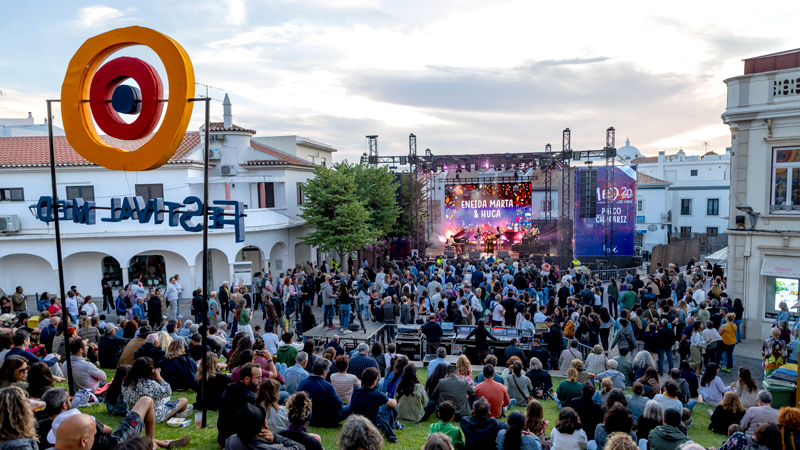The African Diaspora found the walkway for its musical expressions in Portugal. The MED Festival in Loulé served as a platform to expose the ethnic communities of the former Portuguese colonies in Africa. Over three days, the festival embraces cultural diversity while promoting tolerance and respect. It is a remarkable cultural event and affordable to everyone.
The lineup for the third day featured groups and artists from former colonies, including Cape Verdean Tito Paris, Acácia Maior, Guinea-Bissau’s Tabanka Djaz, and Eneida Marta with guest Bruno Huca from Mozambique. Bixiga 70 from Brazil complemented the night, as well as artists from Portugal.
Eneida Marta’s performance opened the night. Barefooted and tall, she sang about love, women’s emancipation, and freedom. Dressed in a black gown with golden decorations, her clean and clear voice captivated the audience at the Chafariz stage. Eneida hails from Guinea-Bissau, a small African country with fewer than two million inhabitants. This nation has faced economic challenges and political instability for so many years. The country borders Senegal, Guinea, and the Atlantic Ocean.
This Saturday, June 29th, marked the busiest day of the festival. Moving from one venue to another took longer than usual, although this 20th edition was less crowded than the previous two. Well-known Brazilian Chico Cesar was the attraction of the festival, but his team canceled his participation. The festival organizers could not replace him, striking a hard blow to the festival.
In the meantime, at the Cerca stage, an attentive audience awaited one of the stellar figures of the Portuguese scene, Cristina Branco. She offered her musical interpretation of the Carnation Revolution. Dressed in black with a red carnation, Branco wrapped her songs in a jazz mantle. Backed by five musicians, including Mário Delgado on electric guitar whose sound was omnipresent, the singer performed José Afonso’s poems from her 2007 album Abril. This material held special relevance due to the 50th anniversary of the April 25th revolution this year. This performance was both thought-provoking and emotionally charged.
Tabanka Djaz opened on the Matriz stage later, the largest venue. Flags of Guinea-Bissau were visible in the audience. More than thirty-two thousand Guinea-Bissauan citizens reside in Portugal.
With over 30 years of experience, Tabanka Djaz has become one of the most important bands on the African continent. Their performance demonstrated this status.
The core of Tabanka Djaz comprises singer and guitarist Micas Cabral, bassist Juvenal Cabral, and keyboardist Jânio Barbosa. The Cabral brothers are nephews of Amilcar Cabral, a pivotal figure in Guinea-Bissau’s independence movement.
Their music style combines Angolan genres like kizomba and semba; Cape Verde’s coladeira and funaná; Guinea-Bissau’s gumbe; and the West Indian zouk popularized by Kassav; along with Congolese soukous influences.

One notable song, “Silence,” spotlighted the kizomba beat with a strong resemblance to the Haitian kompa. This smooth track discusses the importance of silence, dialog, and communication in relationships, a rare theme in popular music. Sung in Cape Verdean Creole, the use of keyboards and synthesizers was haunting.
Another great song, “Bacú,” began with an impressive introduction before transitioning to a syncopated rhythm. The song addresses the subject of adultery with a blend of elegance, and humor.
Micas’ guitar playing was contagious in “Brincadera di aos,” showing those Congolese riffs with its pulsing rhythm, adding intensity to the night. This was followed by a vigorous version of “Tira mão de minha xuxa,” which replaced the Brazilian batucada known in the original version for a galloping zouk-soukous sound and a lusophone flair. The audience participation and the enthusiasm of the Guinea-Bissauan crowd were palpable, and Tabanka’s drummer was the fuel of the band as well.
Tabanka Djaz delivered pure ecstasy and excitement, marking a highlight of the festival.
The power of African-diaspora music has changed Portuguese national identity. For one night, Lusofonia—a concept of shared identity among Portuguese-speaking nations, and championed by Portugal—came alive.
##
Related stories:
Roberto Fonseca, an unforgettable experience.
Festival MED, Part 1 – Exploring Loulé, a Thriving Portuguese Culture Hub
Festival Med Part 2, Rising Portuguese Talent, Kora Master and Much More
Festival MED 2024, Part 3. Roberto Fonseca and Additional Moroccan and Lusophone Talent.


